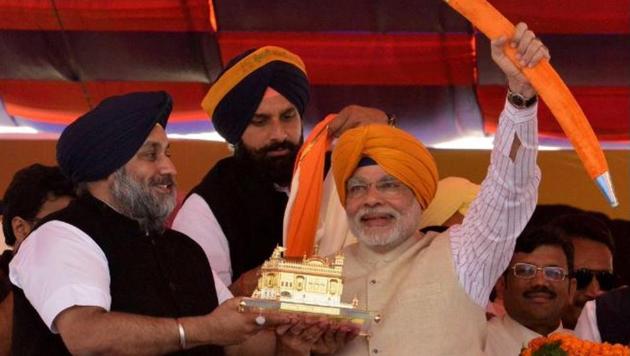Assembly elections: Why was Punjab immune to the Modi ‘magic’?
Despite Modi magic sweeping the assembly polls in Uttar Pradesh and Uttarakhand, it failed in Punjab with the Bharatiya Janata Party (BJP) winning only three of total 23 seats it contested.
Despite Modi magic sweeping the assembly polls in Uttar Pradesh and Uttarakhand, it failed in Punjab with the Bharatiya Janata Party (BJP) winning only three of total 23 seats it contested.

The Hindu voter and the urban areas — two main strongholds of the saffron party — voted for the Congress, pushing the saffron party to the margins. It won a seat each in three regions — Majha, Malwa and Doaba.
The baggage of anti-incumbency of 10 years (along with its ally Shiromani Akali Dal) was too heavy that the saffron party can’t insulate itself.
Also read | From BJP wins in UP, Uttarakhand to Congress surge in Punjab: Five highlights
A BJP leader from Doaba who doesn’t want to be quoted said: “The negativity on the Akali Dal was huge and it overshadowed everything, including Modi’s charisma.”
Though party’s national leaders, including its president Amit Shah, PM Narendra Modi, finance minister Arun Jaitley, home minister Rajnath Singh, campaigned in the state, they failed to woo the voters in BJP’s favour.
Also read | Except 2, all SAD-BJP candidates lose by over 10,000 votes in Amritsar district
BJP suffered a setback winning just three seats out of its share of 23 in coalition with SAD which contested on 94 seats. The saffron party’s vote share also dipped from 7.14% in 2012 to 5.4%. The party had won 12 seats in 2012 and 19 in the 2007 polls.
The hush-hush voices of dissent have started coming out against state unit president Vijay Sampla but everyone, it seems, is waiting for the right time to strike. After the Uttar Pradesh hangover, the party leadership will assess the reasons behind its poor show in Punjab. Sampla will also be back from England tour on March 21.
REASON FOR DRUBBING
Hindu and urban voters swayed in favour of the Congress
The RSS stayed away from active campaigning, particularly for the Akalis
Baggage of 10-year anti-incumbency of the SAD-BJP government was too heavy
BJP top leadership, including Modi, undertook controlled campaign
The state BJP chief’s opposition has started building up as Som Parkash, who has been elected for second consecutive term from Phagwara, said: “I won despite the opposition (from Vijay Sampla) and the party knows it all.”
Party insiders say the Rashtriya Swayamsevak Sangh was annoyed with the SAD due to incidents of attack on its “shakhas” and assassination of one of its top leaders Jagdish Gagneja. The BJP might claim that RSS worked only on 23 seats of their quota but the result doesn’t show it. “After all that do you expect the RSS to help the Akalis?” questioned a BJP leader.
“Two major fault lines emerged during the poll campaign — institutionalised Sikh religion versus deras and radical Sikhs versus Hindus. This shifted the Hindu and urban votes, including Sikhs, towards the Congress,” said Pramod Kumar, director, Institute for Development and Communication.
Head of the political science department, Guru Nanak Dev University, Jagrup Singh Sekhon says: “I think Modi never allowed his magic to work in Punjab. The negativity of the SAD-BJP government was so huge that fighting it would have wasted time and finances, which the party preserved for Uttar Pradesh.”
Corroborating the statement, former BJP state unit president Kamal Sharma said: “The SAD being major partner was leading the campaign and the BJP central leadership campaigned as needed by the alliance.”
The last-minute faux pas by the AAP of giving preference to the radicals also hurt the BJP as Hindu voters voted for a “tangible” force Congress.





